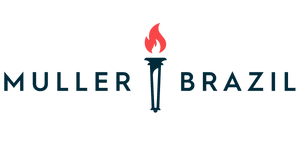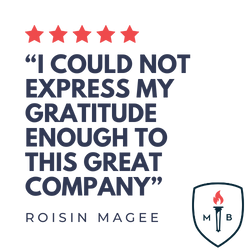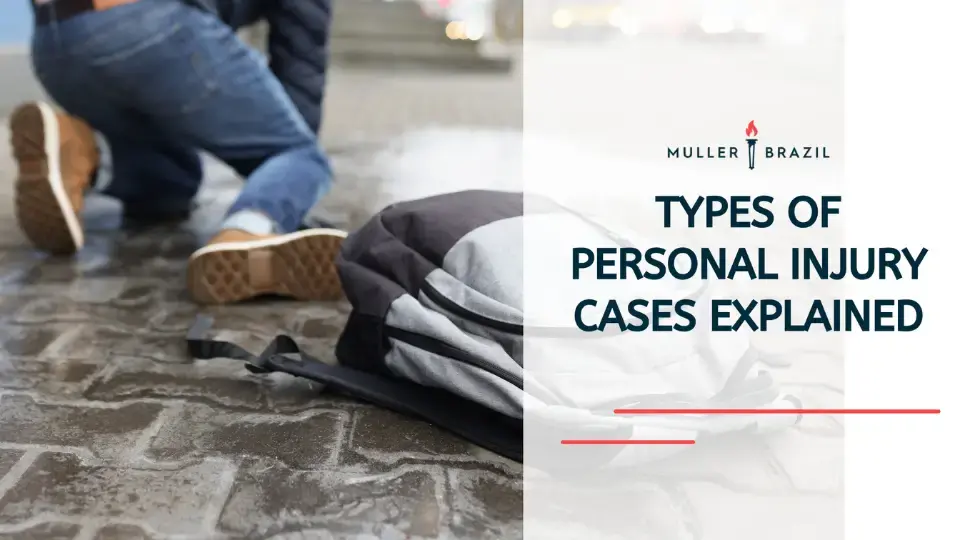7 min read
Types of Personal Injury Cases Explained
![]() Maximillian J. Muller, Esquire
Jan 2, 2025 7:12:55 PM
Maximillian J. Muller, Esquire
Jan 2, 2025 7:12:55 PM
Personal injury law provides a pathway for injured victims to seek compensation for harm caused by someone else’s negligence. Whether it’s a car accident, medical malpractice, or a slip and fall incident, personal injury claims are designed to help injured individuals cover medical expenses, recover lost wages, and address the emotional and physical harm they’ve suffered.
Understanding the various types of personal injury cases is key to recognizing when you might have a valid claim. From motor vehicle accidents to catastrophic injuries, each case presents specific challenges and legal considerations. At Muller Brazil, our team of personal injury attorneys are dedicated to helping injured victims manage the challenges of personal injury law and pursue compensation for their losses.
In this article, we will review the most common types of personal injury cases, what makes them unique, and how an experienced personal injury lawyer can help you recover damages and move forward.
Motor Vehicle Accidents
Motor vehicle accidents are among the most common causes of personal injury claims, often resulting in serious injuries that can leave victims with extensive medical expenses and lost wages. These cases include a variety of incidents, each with unique circumstances and legal considerations.
Car Accidents
Car accidents are one of the leading causes of injuries nationwide. Whether caused by distracted driving, speeding, or reckless behavior, these incidents often result in broken bones, traumatic brain injuries, and emotional distress. Victims can file a personal injury lawsuit to recover damages for medical treatment, vehicle repairs, and other costs.
Truck Accidents
Truck accidents tend to involve more severe injuries due to the size and weight of commercial vehicles. These cases may include additional complexities, such as determining whether the truck driver, trucking company, or another party is financially responsible.
Motorcycle Accidents
Motorcyclists face significant risks on the road due to their vulnerability. Motorcycle accidents often lead to catastrophic injuries, including spinal cord damage and traumatic brain injuries. Proving negligence in these cases can involve examining the accident scene and witness statements.
Pedestrian and Bicycle Accidents
Pedestrian accidents and bicycle collisions frequently occur when drivers fail to yield or pay attention to non-motorists. Injured victims in these cases often sustain severe injuries, such as broken bones or psychological injuries, and may pursue compensation for their suffering.
Premises Liability
Premises liability cases arise when an individual sustains injuries due to unsafe conditions on someone else’s property. Property owners have a legal responsibility to maintain a safe environment and address hazards that could harm visitors. When they fail to do so, injured victims may file a premises liability case to seek compensation for their injuries.
Slip and Fall Accidents
Slip and fall accidents, often caused by wet floors, uneven surfaces, or poorly maintained walkways, are some of the most common premises liability claims. These incidents can lead to broken bones, head injuries, or more severe injuries, requiring extensive medical treatment. Proving negligence often involves showing that the property owner knew, or should have known, about the hazard.
Dog Bites and Animal Attacks
Dog bites can result in physical harm and emotional distress, especially in children. Many states, including Pennsylvania, impose strict liability on dog owners for injuries caused by their pets, meaning they may be held accountable even if the dog had no history of aggression.
Negligent Security
In cases of negligent security, property owners may be held liable for injuries sustained during crimes such as assaults or robberies. For instance, if a poorly lit parking lot or a lack of security personnel contributed to an injury, the injured person may have grounds to file a premises liability claim.
Swimming Pool Accidents
Swimming pools can pose significant safety risks if not properly maintained or secured. Drowning incidents or injuries from unsafe pool areas often lead to premises liability lawsuits, particularly if safety regulations were ignored.
Medical Malpractice
Medical malpractice occurs when healthcare professionals fail to meet the standard of care, resulting in harm to their patients. These cases are challenging, often requiring detailed evidence and expert testimony to prove negligence. Injured victims may file a medical malpractice claim to pursue compensation for medical expenses, emotional distress, and other damages caused by the error.
Misdiagnosis and Delayed Diagnosis
Misdiagnosis or delayed diagnoses can have severe consequences, especially for conditions like cancer or heart disease. When a medical professional fails to properly diagnose an illness, the patient may experience worsening symptoms or miss critical treatment opportunities, leading to a medical malpractice claim.
Surgical Errors
Surgical errors, such as operating on the wrong body part, leaving surgical instruments inside the body, or failing to monitor the patient during surgery, can cause catastrophic injuries. Victims often require additional medical treatment and may suffer physical and emotional harm.
Medication Errors
Medication errors, including prescribing the wrong drug, incorrect dosages, or harmful drug interactions, can lead to life-threatening complications. Pharmacists, doctors, or healthcare facilities may be held liable for these mistakes.
Birth Injuries
Birth injuries, such as cerebral palsy or nerve damage, often result from medical negligence during labor and delivery. These injuries can cause lifelong challenges for the child and emotional distress for the family, leading to claims for compensation.
Nursing Home Abuse
Neglect or abuse in nursing homes, whether physical, emotional, or medical, is another form of malpractice. Failing to provide adequate care or protection for residents can result in serious injuries or wrongful death claims.
Workplace Accidents
Workplace accidents occur when employees sustain injuries while performing their job duties. While many workplace injuries are covered under workers’ compensation, some cases involve third-party negligence or extreme circumstances, allowing the injured person to file a personal injury lawsuit. These claims aim to help injured victims recover damages for medical expenses, lost wages, and more.
Construction Site Injuries
Construction sites are among the most hazardous workplaces, with risks including falls from heights, heavy machinery accidents, and exposure to harmful substances. Injured victims may pursue compensation if a contractor, equipment manufacturer, or another third party’s negligence contributed to their injuries.
Industrial Accidents
Industrial workplaces, such as factories or warehouses, often involve dangerous equipment and hazardous materials. Accidents, including machinery malfunctions or toxic chemical exposure, can result in severe injuries, from burns to traumatic brain injuries.
Repetitive Strain Injuries
Workplace injuries aren’t always the result of a sudden accident. Repetitive strain injuries, like carpal tunnel syndrome or back injuries, occur over time due to repeated movements or poor ergonomics. While these injuries may not involve a single accident scene, they can significantly impact a person’s quality of life and ability to work.
Employer Negligence and Third-Party Claims
While workers’ compensation typically prevents employees from suing their employers, third-party negligence may open the door for a personal injury claim. For example:
- A defective or dangerous product used on the job caused the injury.
- A subcontractor’s negligence led to unsafe conditions.
Contact Us Now
Product Liability
Product liability cases arise when defective or dangerous products cause injuries to consumers. Manufacturers, distributors, and retailers have a legal duty to guarantee their products are safe for use. When they fail to meet this responsibility, injured victims can file a personal injury lawsuit to recover damages for medical expenses, emotional distress, and other losses.
Defective Products
Faulty consumer products, such as electronics, appliances, or children’s toys, can lead to serious injuries. Examples include:
- A kitchen appliance that overheats and causes burns.
- A toy with small parts that present choking hazards for children. Victims may pursue compensation under strict liability, which holds manufacturers accountable regardless of negligence.
Dangerous Drugs
Medications with undisclosed side effects or faulty formulations can result in catastrophic injuries, severe health complications, or even wrongful death. In these cases, pharmaceutical companies and distributors may bear financial responsibility for the harm caused.
Automotive Defects
Defective vehicle components, such as faulty brakes, airbags, or tires, can cause devastating accidents. Injured victims in these cases often sustain broken bones, traumatic brain injuries, or other severe injuries, making it necessary to hold manufacturers accountable for their negligence.
Household and Industrial Equipment
Tools, machinery, and industrial equipment can cause injuries when they malfunction or fail to include proper safety instructions. These cases often involve serious injuries, requiring substantial medical treatment and recovery time.
Proving Negligence in Product Liability Cases
To succeed in a product liability claim, injured persons must show that:
- The product was defective or lacked proper warnings.
- The defect directly caused their injuries.
- They used the product as intended.
Intentional Torts
Unlike negligence-based cases, intentional torts involve deliberate actions by the responsible party that cause harm to another individual. These cases often involve physical, emotional, or psychological injuries and can lead to both civil and criminal proceedings. Injured victims may file a personal injury lawsuit to recover damages for the harm caused.
Assault and Battery
Assault and battery cases occur when an individual intentionally causes physical harm or the fear of harm to another person. Examples include:
- A physical altercation resulting in broken bones or other injuries.
- Threats of violence that cause psychological injuries, such as anxiety or PTSD.
False Imprisonment
False imprisonment involves unlawfully restricting someone’s freedom of movement. For example:
- A store owner wrongfully detains a customer for alleged shoplifting without reasonable cause.
Intentional Infliction of Emotional Distress
When someone’s actions are so extreme and outrageous that they cause severe emotional distress, the injured person may have grounds for a claim. This could include:
- Publicly humiliating or harassing someone in a way that causes long-term psychological harm.
Emotional or Physical Abuse
Intentional abuse, such as nursing home abuse or domestic violence, can result in both criminal charges and personal injury claims. Victims may seek compensation for medical expenses, emotional distress loss, and other damages.
Wrongful Death
Wrongful death occurs when someone’s negligence, recklessness, or intentional actions result in the death of another person. These cases allow the surviving family members to seek compensation for the financial and emotional losses caused by their loved one’s untimely death. While no amount of money can replace a life, a wrongful death claim helps families find justice and secure their future.
Common Causes of Wrongful Death
Wrongful death claims often stem from:
- Motor Vehicle Accidents: Fatal crashes involving cars, motorcycles, or trucks caused by someone else’s negligence.
- Medical Malpractice: Errors such as surgical mistakes, misdiagnoses, or medication overdoses that lead to death.
- Workplace Accidents: Fatal injuries on dangerous job sites, including construction or industrial environments.
- Defective Products: Dangerous or faulty products that result in catastrophic injuries and loss of life.
- Intentional Acts: Homicides or other violent actions that intentionally harm another person.
Compensation for Surviving Family Members
In a wrongful death lawsuit, the plaintiff (often a family member or estate representative) may recover damages, including:
- Medical Bills: Costs incurred before the victim’s death.
- Funeral and Burial Expenses: Financial burden placed on the family.
- Lost Income: Compensation for the financial support the deceased would have provided.
- Emotional Distress: Suffering caused by the loss of companionship and emotional support.
Proving Negligence in Wrongful Death Cases
To succeed in a wrongful death claim, it must be shown that:
- The defendant owed a duty of care to the deceased.
- The defendant breached this duty, leading to the death.
- The family suffered measurable damages due to the loss.
Your Path to Justice with Muller Brazil
Most personal injury cases help injured victims and their families recognize when they have a valid claim. From motor vehicle accidents and medical malpractice to wrongful death, each case presents unique challenges that require the expertise of an experienced personal injury attorney. Seeking compensation for medical expenses, lost wages, and emotional distress can help injured victims recover damages and regain stability in their lives.
At Muller Brazil, our mission is to offer caring and results-driven legal advocacy for injured victims throughout Philadelphia. Our team of personal injury lawyers handle every step of the legal process, from gathering witness statements and proving negligence to negotiating with insurance companies or taking your case to court. Let us focus on the legal details so you can focus on your recovery.
If you have sustained injuries due to someone else’s negligence, don’t wait to take action. Contact Muller Brazil today for a free consultation to discuss your case and explore your options. Call us at 215.885.1655 or email us at info@mullerbrazil.com to learn more about how we can help you pursue the compensation you deserve.
Meet the Author
Paul Brazil - Founding Partner
Paul Brazil is a native of Dunmore, Pennsylvania and a graduate of Dunmore High School. For his undergraduate education, he attended Bloomsburg University where he majored in political science. He then went on to earn his JD from Widener University School of Law. Following graduation from law school, Mr. Brazil worked at a large Philadelphia civil defense firm where he litigated workers’ compensation claims and Heart and Lung Act cases.
Learn more about Paul Brazil ⇒





